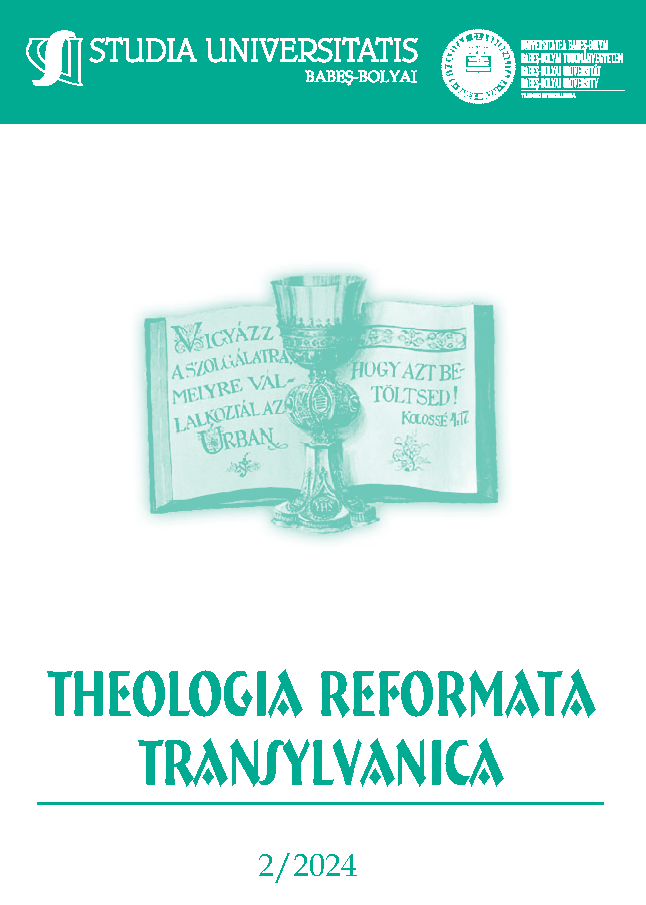A vallás és spiritualitás mint védőfaktor a kolozsvári RTZK vallástanárszakos hallgatóinak mentális egészsége szempontjából
DOI:
https://doi.org/10.24193/subbtref.69.2.12Keywords:
spirituality, religion, mental health, teacher educationAbstract
Religion and Spirituality as Protective Factors for the Mental Health of the Students at the Faculty of Reformed Theology and Music. This study focuses on certain aspects of spiritual well-being and examines how religiosity and spirituality can serve as protective factors in maintaining mental health and function as coping mechanisms. After a (non-exhaustive) review of the relevant literature on this subject, we present some practices and reflections used during group activities with the students of the Faculty of Reformed Theology at Cluj-Napoca. Ideally, the work of a religion teacher also has spiritual dimensions. It is important that the training includes reflections on religious, Christian spirituality. Reflecting on spirituality serves a dual purpose: on the one hand, it helps students view their spirituality as a resource for the protection of their mental health, and, on the other hand, it helps them recognize that the awareness and development of religious spirituality is also their professional duty, as it has a direct impact on the students entrusted to them.
During groupwork with the future religion teachers, our primary focus was on clarifying and deepening their awareness of spiritual capabilities and reflecting on key concepts of religious spirituality (such as prayer and the image of God), which can serve as resources in protecting their mental and spiritual health.
References
ALLPORT, W. G. – ROSS, J. M. (1967): Personal Religious Orientation and Prejudice, In: Journal of Personality and Social Psychology. 5. 432–443.
BAKK-MIKLÓSI Kinga – HÉZSER Gábor (2023): Pasztorálpszichológia. Rendszerszemléletű alapok és gyakorlati szempontok segítőknek. Budapest – Kolozsvár, Kálvin Kiadó – Exit Kiadó – Erdélyi Múzeum Egyesület.
BATSON, C. D. – SCHOFNRADE, P. –VENTIS, W. (1993): Religion and Their Individual: A Social-Psychological Perspective. New York, Oxford University Press.
BÉRI László (2016): A te arcod keresem, In: Embertárs. 2. 119–133.
EMMONS, R. (2003): The Psychology of Ultimate Concern. New York: Guilford.
FERENCZ Emese (2017): Vallásos megküzdés az élet alkonyán, In: Keresztyén Szó. https://epa.oszk.hu/00900/00939/00194/EPA00939_kereszteny_szo_2017_01_4.html (utolsó megtekintés dátuma: 2020.01.12.).
FRIELINGSDORF, K. (2019): Istenképek, ahogy beteggé tesznek – és ahogy gyógyítanak. Budapest, Szent István Társulat.
GOTTLIEB, B. (1997): Conceptual and Measurement Issues in the Study of Coping with Chronic Stress, In: Gottlieb, B. (szerk.): Coping with Chronic Stress. Springer Science+Business Media, LLC. 3–42.
HODGES, Shannon (2002): Mental Health, Depression and Dimensions of Spirituality and Religion, In: Journal of Adult Development. 9. 2. 109–114.
HORVÁTH-SZABÓ Katalin (2007): Vallás és emberi magatartás. Piliscsaba, Pázmány Péter Katolikus Egyetem.
HORVÁTH-SZABÓ Katalin – HARMATTA János – TOMCSÁNYI Teodóra (2009): Teisztikus és humanisztikus spriritualitás, In: Pszichoterápia. 18. 3. 173–179.
HOUTMAN, D. – AUPERS, S. (2007): The Spiritual Turn and the Decline of Tradition, In: Journal of the Scientific Study of Religion. 46. 3. 305–320.
JAMES, A. – WALES, A. (2003): Religion and Mental Health: Towards a Cognitive Behavioral Framework, In: British Journal Health Psychology. 8. 359–376.
KIRKPATRICK, L. (1999): Attachment and Religious Representations and Behavior, In: Cassidy, J. – Shaver, P. (szerk.): Handbook of Attachment: Theory, Research, and Clinical Applications. New York, Guilford.
KOENIG, H. (2002): The Connection between Psychoneuroimmunology and Religion, In: Koenig, H. G. – Cohen, H. J. (szerk.): The Link between Religion and Health: Psychoneuroimmunology and the Faith Factor. Oxford University Press. 11–30.
KOVÁCS Eszter (2012): A tradicionális szociokulturális védőfaktorok szerepe a fiatalkori problémaviselkedésben. Budapest: Doktori tézis. http://old.semmelweis.hu/wp-content/phd/phd_live/vedes/export/kovacseszter.m.pdf (utolsó megtekintés dátuma: 2024.02.01.).
MCCULLOGH, M. – LARSON, D. (2003): Prayer, In: Miller, W. (szerk.): Integrating Spirituality into Treatment. Washington D. C., APA.
NEMES Ödön (2004): A lelkigondozás spiritualitása, In: Embertárs. 3. 314–324.
PARGAMENT, K. – PARK, C. (1995): Merely Defense? The Variety of Religous Means and Ends, In: Journal of Social Issues. 51. 2. 13–32.
PIKÓ Bettina (2012): Fiatalok lelki egészsége és problémaviselkedése a rizikó- és protektív elmélet, a pozitív pszichológia és a társadalomlélektan tükrében. Szeged. http://reald.mtak.hu/566/7/dc_310_11_doktori_mu.pdf (utolsó megtekintés dátuma: 2023.06.12.).
PIKÓ Bettina – KOVÁCS E. – KRISTON, P. (2011): Spiritualitás – Vallás – Egészség. Fiatalok mentális egészsége a spirituális jóllét mutatóinak tükrében, In: Mentálhigiéné és Pszichoszomatika. 12. 3. 261–276.
ROBU Magda (2013): Az istenreprezentáció kognitív szempontú vizsgálata. Doktori értekezés. Debrecen. https://dea.lib.unideb.hu/server/api/core/bitstreams/6f011330-34fc-4978-8b16-dac3572e32e3/content (utolsó megtekintés dátuma: 2024.12.14.).
SZABÓNÉ LÁSZLÓ Lilla (2021): Gyógyító jelenlét – Isten jelenlétének valósága a lelkigondozás, lelki kísérés, testvéri melléállás alkalmain, In: Siba Balázs – Szabóné László Lilla – Lányi Gábor (szerk.) (2021): Lelki éhség – Protestáns spiritualitás a 21. században. Budapest, Kálvin János Kiadó. 232.
SZENTMÁRTONI M. (2000): A gyógyító Jézus nyomában. Budapest, Új Ember.
Downloads
Published
How to Cite
Issue
Section
License
Copyright (c) 2024 Studia Universitatis Babeș-Bolyai Theologia Reformata Transylvanica

This work is licensed under a Creative Commons Attribution-NonCommercial-NoDerivatives 4.0 International License.



